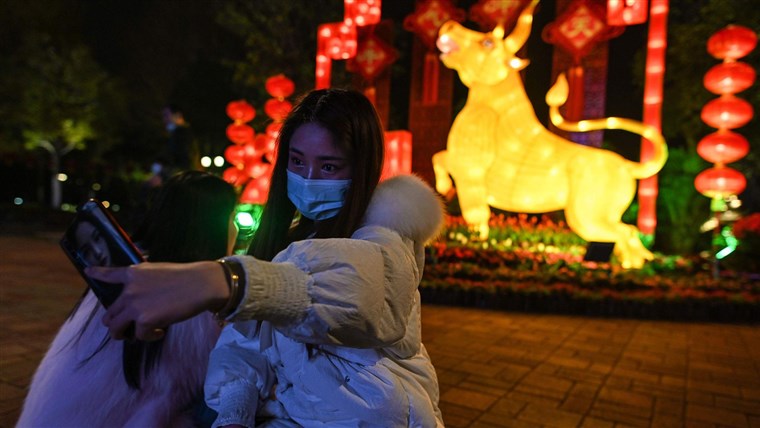HONG KONG — No one invited Bu Yunhao to be in their group for the annual class trip. The other fifth graders at Shanghai Shangde Experimental School made fun of the 11-year-old, calling him “too girly.”
“I wanted to run away, right out of the classroom,” said Yunhao, now 13 and a first-year middle schooler in Shanghai, China‘s largest city.
Some of Yunhao’s classmates made fun of his high-pitched voice and the way he “screamed” when he tried to maintain discipline among his fellow students as a class monitor. Others teased him for spending so much time with girls and said he acted like he was “trying to date” the other boys in the class.
The bullying eventually stopped, but a recent announcement by the government that singles out boys who don’t fit traditional Chinese ideas of masculinity has revived the painful memories. The plan to “encourage masculinity” in male students has inflamed a debate over modern gender roles as China’s government increasingly emphasizes what many consider to be outdated and damaging stereotypes for men and boys.
“Boys don’t need masculinity education,” said Lü Pin, the founder of China’s largest feminist advocacy media channel, Feminist Voices, which was banned by Chinese censors in 2018.
“The concept of masculinity forces every man to be tough, which excludes and harms men with other types of characteristics,” she said. “It also reinforces men’s hegemony, control and position over women, which goes against gender equality.”
In January, China’s Education Ministry published plans to “cultivate masculinity” in boys from kindergarten through high school. The initiative involves hiring and training more gym teachers, testing students more comprehensively in physical education, making health education compulsory and supporting research into issues like the “influence of the phenomenon of internet celebrities on adolescents’ values.”
The plan follows a warning from one of China’s top political advisers that the nation is experiencing a national “masculinity crisis.”
“Chinese boys have been spoiled by housewives and female teachers,” the adviser, Si Zefu, said in a policy proposal in May. Boys would soon become “delicate, timid and effeminate” unless action was taken, he said.
Addressing the issue is a matter of national security, he wrote, warning that the “feminization” of Chinese boys “threatens China’s survival and development.”
Boys in China traditionally are expected to show strong leadership skills, get good grades in math and science and excel in school sports, Fang Gang, a sociology professor at Beijing Forestry University, wrote in a blog post about the proposed changes on Jan. 30.
Girls, meanwhile, traditionally are viewed as less intellectual, and they are expected to be less competitive. The gender norms are rooted in traditional philosophy, in which two elements govern the world: Women are associated with the softer, more passive element of “yin”; men are represented by the tougher, more active element of “yang.”
The ideas about gender roles have begun to change in recent years, however. Since 2010, more girls than boys have entered universities, and girls regularly outperform boys in standardized testing, calling into question the traditional view that boys are naturally more academic.
The change has led to a common saying: “Yin in prosperity and yang in decline.”
The growing popularity of male Chinese pop stars who wear makeup and androgynous, sparkly clothing has also influenced youth culture. Taking inspiration from Confucianism and South Korean pop culture, China’s young style connoisseurs have embraced the “gentle style” look, a softer form of masculinity that stands in sharp contrast to traditional tough-guy tropes, allowing more diverse forms of self-expression.
The rising economic status of women and increasing feminism have also upended traditional ideas of masculinity. China has a stark gender imbalance — in a country of 1.4 billion people, there are nearly 37 million more men than women, a consequence of the preference for sons under China’s one-child policy, which was in place from 1979 to 2015. Today, however, women are more able to show competitiveness and leadership in the workplace, and they are able to take more initiative when it comes to dating and marriage.
Still, the Chinese government maintains a more conservative view of how men and women should behave. Depictions of gay relationships are banned from Chinese television under a 2016 law barring “vulgar, immoral and unhealthy content.” And while homosexuality was decriminalized in 1997, no law prevents discrimination based on sexual orientation.
In September 2018, when a television special shown to students on the first day of school featured male Chinese pop stars, furious editorials in major newspapers called the stars a bad influence. The government-run news agency Xinhua described the performance as “like putting chili in your eyes.”
In 2019, Chinese censors started blurring earrings and colored hair on male celebrities appearing on shows as part of a ban on feminine representations, and they deleted scenes depicting homosexuality from the movie “Bohemian Rhapsody.”
The prospect of same-sex marriage is making headway, however, and the first same-sex kiss of the “Star Wars” franchise made it into Chinese theaters.
Chen Yong, 50, of Shanghai said that he wasn’t a fan of the “feminization” of pop culture but that he believed people should have the freedom to choose how they live. He was more conservative when it came to his 13-year-old son, however.
“My son used to be delicate and introverted, so I encouraged him to be more masculine by playing basketball and practicing taekwondo,” he said.
Chen said he would accept his son if he stayed “soft” despite playing more sports. But there were still “certain lines” he wouldn’t let him cross, like raising his pinkie finger in the gesture known in China as “orchid finger,” which is stereotypically associated with gay men and transgender women.
Experts take issue with such gender stereotypes.
“Men are not necessarily aggressive, competitive and athletic, while women are not necessarily passive, emotional and soft,” sociologist Fang Gang wrote. “Good characteristics are unisex, which both girls and boys should learn.”
Geopolitics may be behind the government’s fears that “yang” is on the decline, said Joshua Eisenman, an associate professor at the University of Notre Dame’s Keough School of Global Affairs who is a senior fellow in China studies at the American Foreign Policy Council.
China’s preoccupation with its people’s physical prowess began during the “Century of Humiliation,” he said by email, referring to the period from 1839 to 1949 when the country was repeatedly colonized or beaten in war by Britain, France, Germany, Russia and Japan.
“The narrative taught to all Chinese children remains that under the [Communist] party’s leadership, China strengthened itself to resist and overcome the West,” Eisenman said. “What concerns me most about this new policy is its distinctive appeal to a concept of masculinity that is defined by service of the state.”
In China, some teachers say the plan’s key proposal, an overhaul of the physical education curriculum, is unrealistic given the pressures of the education system.
Guo Biyan, a gym teacher at a primary school in China’s southeastern Zhejiang province, said he is leading just two physical education classes a week, even though the government requires four weekly sessions. And even then, other teachers sometimes pressure him to limit the extent to which students actually exercise in his classes so they can reserve energy for their academic studies, he said.
“Main subject teachers and lots of parents think it’s fine if [students] don’t get enough exercise, because PE is only a small part of school exams,” Guo said.
Yunhao, who was shunned by his classmates for being too feminine, said he’s comfortable with who he is now and doesn’t need to try to be more masculine.
“I’m a kind guy. I’m outgoing, modest, gentle and considerate. I’ve made lots of friends now,” he said. “Saying I’m ‘girly’ is superficial.”Zixu Wang and Xin Chen reported from Hong Kong, Caroline Radnofsky reported from London.










Recent Comments